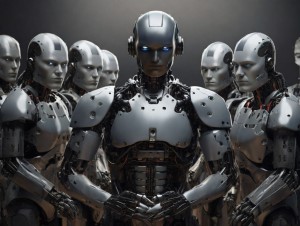At the intersection of cryptocurrency (crypto) and artificial intelligence (AI), we find a fusion of two groundbreaking technologies, Bitcoin and Artificial Intelligence, that have individually revolutionized various aspects of our lives. Both crypto and AI bring unique strengths to the table, and their convergence has the potential to reshape multiple industries, from finance to healthcare and beyond.
Crypto, often epitomized by Bitcoin, is a digital currency that operates independently of traditional financial institutions. It offers decentralization, transparency, and security in a world where trust in centralized authorities is waning. The crypto market has grown exponentially, captivating investors, and fostering innovation in financial technology.
On the other hand, AI is the intelligence exhibited by machines, enabling them to perform tasks that typically require human intelligence. It excels in processing vast amounts of data and extracting valuable insights. AI is behind the personalization of online experiences, voice assistants, and autonomous vehicles, among many other applications.
The significance of crypto lies in its potential to democratize finance, providing access to financial services for the unbanked and challenging the status quo of traditional banking. AI, with its data-driven decision-making capabilities, is poised to enhance the efficiency and accuracy of various processes across industries.
As we delve into the intersection of crypto and AI, we’ll explore the opportunities and challenges that arise when these two transformative technologies come together, revealing a landscape where innovation knows no bounds.
Background and evolution
In understanding the importance of the convergence of cryptocurrency (crypto) and artificial intelligence (AI), it’s crucial to delve into their historical development and core principles.
Cryptocurrency’s journey
Cryptocurrency had a humble beginning with the introduction of Bitcoin in 2009 by an anonymous person or group known as Satoshi Nakamoto. Bitcoin brought forth the concept of a decentralized digital currency, powered by blockchain technology. Blockchain, the underlying ledger for most cryptocurrencies, ensures transparency and security through a distributed network of nodes, making transactions immutable.
Over the years, crypto evolved beyond Bitcoin. New cryptocurrencies emerged, each with its unique features and applications. Ethereum, for example, introduced smart contracts, self-executing contracts with the potential to automate various processes, from financial transactions to digital asset management.
The significance of cryptocurrency lies in its potential to disrupt traditional finance, offering borderless transactions, financial inclusivity, and reducing reliance on intermediaries, like banks. It’s not merely a digital currency but a transformative force challenging conventional financial systems.
The rise of artificial intelligence
In parallel, the rise of AI has been nothing short of revolutionary. AI’s journey can be traced back to the mid-20th century, but its recent surge is due to advancements in computing power and the availability of massive datasets. Machine learning, a subset of AI, empowers systems to learn from data and improve their performance over time.
AI found applications in diverse industries. In healthcare, it aids in disease diagnosis and drug discovery. In transportation, it drives self-driving cars. In finance, AI-driven algorithms make complex trading decisions. In customer service, chatbots provide instant assistance.
**Enhanced Security**
When it comes to ensuring cryptographic security, artificial intelligence (AI) plays a vital role in fortifying the trustworthiness of cryptocurrency platforms. Here, we’ll explore the role of AI in bolstering security and share real-world examples of AI in action.
The Potential of Bitcoin and Artificial Intelligence
The future potential of AI in blockchain technology is boundless. Here’s what we can expect:
- Enhanced security: AI will continue to evolve its threat detection capabilities, making blockchain networks even more secure against attacks.
- Efficiency: AI-driven optimizations will make blockchain transactions faster and more cost-effective, making them more appealing for everyday use.
- Interoperability: AI can be pivotal in achieving interoperability between different blockchain networks, enabling seamless data sharing and transactions.
- AI-Driven DeFi: Decentralized Finance (DeFi) platforms will integrate AI for better risk assessment, lending, and yield optimization, increasing reliability.
AI’s role in cryptographic security
AI is a formidable ally in safeguarding the integrity and security of cryptographic systems. Its applications in this realm are multifaceted:
1. Threat detection: AI-driven algorithms continuously monitor blockchain networks for any suspicious activity. They can detect anomalies in transaction patterns, flagging potential threats in real-time. This proactive approach helps thwart security breaches before they escalate.
2. Fraud Prevention: In the crypto world, fraudsters are always devising new tactics. AI’s ability to analyze vast amounts of data makes it an excellent tool for identifying fraudulent transactions and activities. By recognizing patterns indicative of fraud, AI can mitigate risks.
Real-World examples
Let’s look at real-world instances where AI has successfully detected security threats or breaches in the cryptocurrency space:
1. Transaction monitoring: AI-powered systems like Chainalysis are widely used by crypto exchanges and law enforcement agencies. They track transactions on various blockchains, identifying suspicious behavior, and helping authorities combat illegal activities such as money laundering and fraud.
2. Wallet security: Some crypto wallets employ AI-driven security features. They can detect unauthorized access attempts and flag them for the user to take action, enhancing the safety of users’ digital assets.
Enhancing trustworthiness
By integrating AI-driven security measures, crypto platforms bolster their trustworthiness in several ways:
1. Transparency: AI’s ability to analyze blockchain data ensures transparency. Users can verify the legitimacy of transactions and the integrity of the blockchain, fostering trust in the platform.
2. Quick response: AI’s real-time threat detection enables rapid response to security incidents. This agility reassures users that their assets are protected and that the platform is vigilant against potential threats.
Trading automation
In the world of cryptocurrency, trading automation has witnessed a significant transformation with the advent of AI-driven trading bots. Here, we’ll introduce you to these bots, discuss their benefits, potential pitfalls, and provide real-world case studies that highlight their effectiveness in crypto trading.
AI-driven trading bots
AI-driven trading bots are computer programs designed to execute trading strategies automatically based on predefined rules and algorithms. They leverage artificial intelligence to analyze market data, identify opportunities, and execute trades without human intervention. These bots operate 24/7, responding to market fluctuations in real-time.
Benefits of automated trading
- Speed and efficiency: AI bots can execute trades at lightning speed, reacting to market changes faster than any human trader. This efficiency is crucial in the volatile crypto market.
- Emotionless trading: Unlike human traders, bots are not influenced by emotions like fear or greed. They stick to their strategies, reducing the likelihood of impulsive decisions.
- 24/7 Availability: Bots don’t need rest. They can monitor the market around the clock, ensuring no trading opportunities are missed, even during nighttime or holidays.
Potential pitfalls
- Algorithmic errors: While AI bots can be highly sophisticated, they are not immune to coding errors. A bug or glitch in the trading algorithm can lead to significant losses.
- Over-optimization: Over-optimizing trading strategies for historical data may not perform well in live markets, leading to losses.
- Market risks: The crypto market is highly unpredictable, and sudden price movements can catch bots off guard, resulting in losses.
Real-world case studies
1. 3Commas: This trading bot platform offers a range of AI-powered tools, including Smart Trade and TradingView integration. Users have reported increased profits and risk management capabilities.
2. Gekko: An open-source crypto trading bot, Gekko, has a strong community of users and developers. It offers various strategies and has a track record of successful trading.
3. HaasOnline: HaasBot is a popular trading bot that offers users customizable trading strategies. It has shown effectiveness in optimizing trading performance.
AI-driven trading bots have become valuable tools in the crypto trading landscape. They offer speed, efficiency, and emotionless trading but also have potential risks. Real-world case studies demonstrate their effectiveness when used wisely. As the crypto market continues to evolve, these bots will likely play an increasingly prominent role in helping traders navigate the complexities of digital asset trading.
How AI Optimizes Blockchain Tasks
Optimizing blockchain operations with the power of AI is a game-changer. Let’s dive into the technicalities, explore real-world examples, and ponder the future potential of this exciting fusion. AI enhances blockchain operations through several key mechanisms:
1. Scalability: AI algorithms can optimize blockchain networks to handle more transactions per second. This scalability is crucial as it ensures the blockchain can grow and accommodate increasing demands.
2. Smart contracts: AI can make smart contracts even smarter. AI can trigger and execute smart contracts when predefined conditions are met by analyzing real-time data, enhancing automation and efficiency.
3. Data analysis: AI excels at analyzing vast amounts of blockchain data. It can identify trends, anomalies, and potential security threats, helping maintain a healthy and secure blockchain network.
Examples of Blockchain Networks Leveraging AI
1. Ethereum 2.0: The upgrade to Ethereum’s blockchain, Ethereum 2.0 or Eth2, incorporates AI-driven consensus mechanisms like Proof of Stake (PoS) to improve scalability and energy efficiency.
2. IOTA: IOTA integrates AI for data analysis and security. Its Tangle technology utilizes AI to monitor transactions and identify malicious activities.
3. Hyperledger fabric: This enterprise-focused blockchain framework employs AI to enhance privacy and confidentiality, making it suitable for various industries, including finance and healthcare.
The role of AI in smart contract analysis
Smart contracts are the backbone of blockchain technology, playing a pivotal role in its functionality. In this section, we’ll explore what smart contracts are, their critical importance for blockchain, the role of AI in analyzing and validating them, and the real-world implications of this synergy.
Smart contracts are self-executing contracts with predefined rules and conditions written into code. They automate and enforce agreements between parties without the need for intermediaries. This automation is crucial for blockchain because it ensures trust and transparency among participants.
AI plays a critical role in smart contract analysis, validation, and authenticity assurance. It achieves this through:
– Code analysis: AI can scan smart contract code for vulnerabilities, ensuring it is secure and error-free. This reduces the risk of exploits or contract failures.
– Data verification: AI can cross-reference data sources to validate the inputs and outputs of a smart contract, ensuring they match real-world data accurately.
– Predictive analysis: AI can anticipate potential contract disputes or conflicts by analyzing historical data, thus improving contract terms and dispute resolution mechanisms.
Real-world implications of AI-driven smart contract validation
1. Enhanced security: AI-driven smart contract analysis enhances security by identifying vulnerabilities or potential exploits before malicious actors can leverage them.
2. Reduced disputes: AI’s predictive analysis can create smarter, more precise contracts, reducing the likelihood of disputes and the need for costly legal interventions.
3. Efficiency: Smart contracts validated by AI can execute transactions more efficiently, as they can quickly verify data and ensure compliance with predefined rules.
4. Wider adoption: Trust in blockchain technology grows as AI-driven smart contracts become more reliable, paving the way for broader adoption across industries.
**Smart Contract Analysis**
Smart contracts are the backbone of blockchain technology, playing a pivotal role in its functionality. In this section, we’ll explore what smart contracts are, their critical importance for blockchain, the role of AI in analyzing and validating them, and the real-world implications of this synergy.
Challenges and ethical considerations
While promising, AI and crypto convergence presents challenges and ethical considerations. First, risks are associated with relying solely on AI predictions in cryptocurrency trading, as market volatility can defy even the most advanced algorithms. Additionally, the anonymous nature of crypto transactions can be exploited for illegal activities, posing regulatory challenges.
Ethically, transparency and fairness are crucial. AI algorithms must not favor specific groups or manipulate markets unfairly. Preventing the misuse of AI for malicious purposes, such as market manipulation or cyberattacks, is paramount.
Conclusion
The fusion of crypto and AI is reshaping the tech landscape. It offers enhanced security, automated trading, optimized blockchain operations, and predictive insights. As businesses and investors embrace this synergy, the future holds immense potential.
Looking ahead, advancements in AI will continue to drive innovation in crypto, benefiting users and investors. However, vigilance in addressing challenges and upholding ethical standards is essential to ensure a harmonious coexistence of AI and crypto in the ever-evolving tech world.





